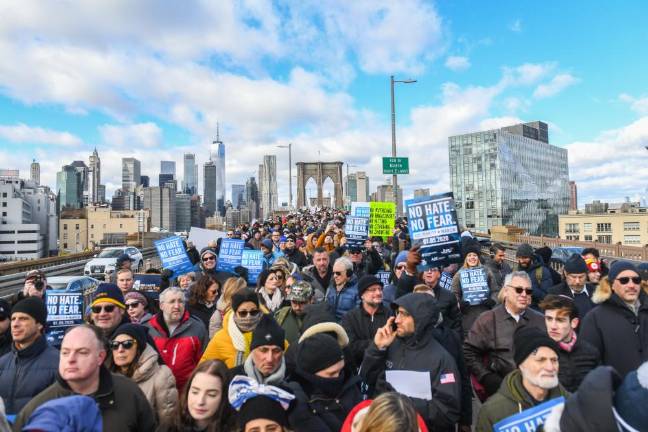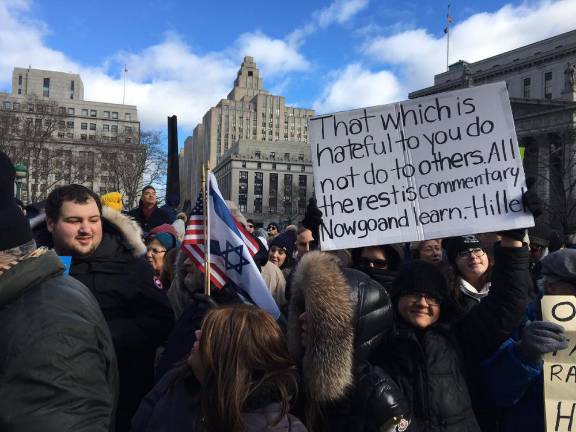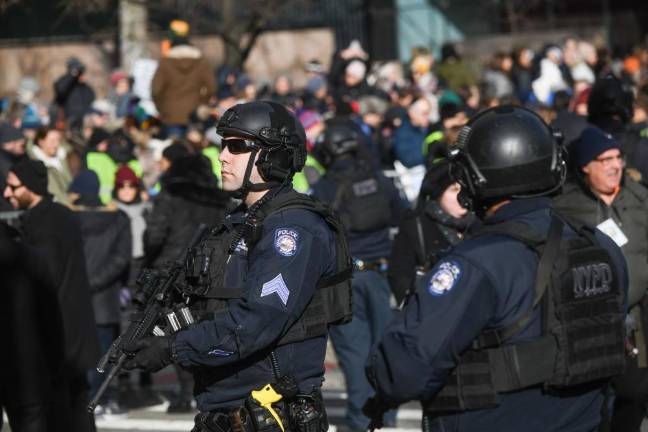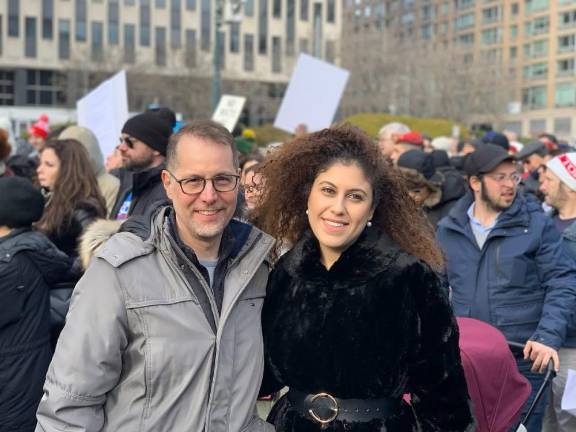“No Hate. No Fear.”
“#JewishANDProud.”
“America 2020 Not Germany 1933.”
The signs were everywhere on a cold, clear day in Lower Manhattan. After a series of brutal attacks on Jews in and around New York City, an estimated 25,000 people gathered at Foley Square on Sunday, Jan. 5, then marched across the Brooklyn Bridge. The crowd was joined by an array of New York politicians, including Gov. Andrew Cuomo, Mayor Bill de Blasio, Senators Chuck Schumer and Kirsten Gillibrand, U.S. Reps. Jerrold Nadler and Carolyn Maloney, NY Attorney General Letitia James, Manhattan Borough President Gale A. Brewer, City Council Speaker Corey Johnson and Council Member Mark Levine.
“A single march is not going to end anti-Semitism in NYC,” Levine tweeted. “But the size--and diversity--of this outpouring of support for the Jewish community is unprecedented.”
The march capped a grim holiday season. In the 22 days between Dec. 10, when three people were massacred in a Jersey City kosher grocery, and New Year’s Day, when an observant Jew was punched in the throat in Brooklyn, there have been at least 18 anti-Semitic incidents in New York.
And 14 of those hate crimes took place in the 10 days leading up to Jan. 1, according to the Anti-Defamation League’s Tracker of Anti-Semitic Incidents, which compiles recent cases of anti-Jewish vandalism, harassment and assault reported to or detected by the group.
The most violent incident was a machete attack at the home of a rabbi in Monsey, NY on Dec. 28, during a Hanukkah celebration. Five people were wounded, including Josef Neumann, who suffered serious head injuries and has been unconscious since the attack.
“The doctors do not have high hopes for him,'' said Neumann’s daughter Nicky Kohen, who spoke to reporters on Jan. 2 with her six siblings. “We hope he wakes to a changed world with peace, unity and love for all.''
The alleged attacker, Grafton Thomas, was indicted on six counts of second-degree attempted murder, three counts of first-degree assault, three counts of first-degree attempted assault and two counts of first-degree burglary. The charges carry a potential penalty of 25 years in prison.
A Crisis, by the Numbers
According to the NYPD, anti-Semitic incidents are the most common hate crimes reported in the city, comprising 53.7 percent of all reported hate crimes from January to September 2019. There were 234 anti-Semitic incidents in all of 2019, compared to 186 in 2018, a 26 percent increase, NYPD stats show.
On Friday Dec. 27, the day before the attack in Monsey, de Blasio announced that Borough Park, Crown Heights and Williamsburg — three neighborhoods with heavy concentrations of Orthodox Jews — would be provided at least temporarily with beefed-up police patrols.
Two days later, he held a press conference to announce further new steps to try to end what he called the city’s anti-Semitism “crisis.” Effective immediately, more police would be sent into Brooklyn’s Jewish neighborhoods, and additional lighting and cameras would be installed.
“We have great faith in God and we have great faith in the NYPD,” Rabbi Joseph Potasnik, executive vice president of the New York Board of Rabbis, told reporters at the press conference after the new measures were announced.
[[LIV - THE FACT BOX COPY STARTS HERE]] Other city leaders offered a united front against hate, and a variety of initiatives.
*In a “Dear Friends” letter to his congregants on Dec. 29, Rabbi Joshua Davidson, the senior rabbi of Temple Emanu-El on Fifth Avenue, stressed interfaith outreach as a critical means of combating the “scourge of hate.” He told of getting calls from several Christian friends offering consolation and support, among them the Rev. Calvin Butts from the Abyssinian Baptist Church in Harlem.
“I firmly believe interfaith partnership and education to be our two most important tools in this battle,” Davidson said. “Much work lies before us as the New Year begins.”
* UJA-Federation of New York and the Jewish Community Relations Council unveiled a joint $4 million program to build a robust security infrastructure at over 2,000 schools, synagogues, camps, community centers and other Jewish institutions in the New York area.
Faced with unprecedented public safety challenges, the Community Security Initiative, operational since October, will provide training for guards and worshippers, upgrade physical security at shuls, develop enhanced communications, tap government funding and staff up with six security professionals.
* Mitchell Silber, the NYPD’s former director of intelligence analysis and head of the department’s cyber intelligence unit, was named executive director of the new protection initiative on Dec. 30. An expert on risks and threats facing European Jewish communities, he is the author of “Terrorist Attacks against Jewish Targets in the West: The Atlantic Divide between European and American Attackers.”
In addition to calling for increased police patrols and establishing fixed NYPD posts, Silber said that undercover cops, dressed as observant Jews, should be deployed “for the foreseeable future.”
And he brought up a controversial concept that was on full display in Monsey, when an Orthodox congregant ended the assault when he threw a table at Thomas – self-defense. While the need for a minority to provide for its own defense is unfortunate, Silber said in a speech, “The Jewish community must now be proactive in protecting itself.”
* Upper East Side Rep. Carolyn Maloney and Upper West Side Rep. Jerrold Nadler joined eight other Democratic members of the city’s Congressional delegation at the Museum of Jewish Heritage on Jan. 2 to unveil a steep boost in federal security funding for houses of worship.
“New York is experiencing historic lows in crime, but a big increase in hate crimes,” Maloney said. “Since government’s first responsibility is to keep our people safe, that’s just unacceptable.”
The 10 lawmakers said high-risk synagogues and community centers, as well as churches and mosques, can now tap a $90 million security grant program, up from $50 million in 2019, to hire and train guards and buy state-of-the-art protection – like surveillance cameras that can face into a shul and out onto the street at the same time.
Congress allocated the funding in December as religious institutions and congregants seemed increasingly under siege – and members said they’ll host grant workshops around the city in the coming weeks and months to educate nonprofits about the grants and help them apply for funding.
With reporting from the Associated Press



